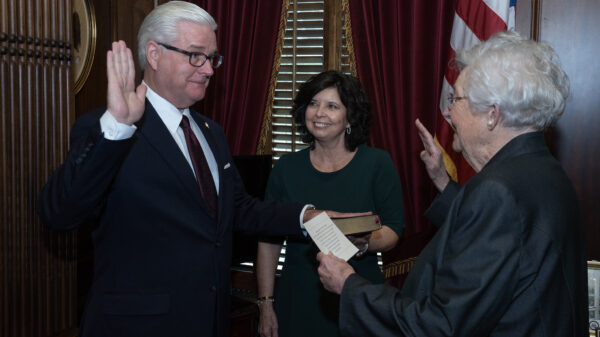|
Getting your Trinity Audio player ready...
|
When Merika Coleman, D-Birmingham, joined the Alabama House 20 years ago, she was part of the majority party.
After a decade with the numbers advantage, the House flipped towards Republicans, and Coleman has spent the last 10 years in the minority.
Now elected to move upstairs to the Senate, Coleman said she is hopeful that the leadership there remembers what it is like to be part of the minority party.
“I feel so far that the camaraderie is different in the Senate since (being sworn in) November. In the House there’s a lot more people, a lot of different players,” Coleman said. “The main thing I’ve noticed thus far in the Senate is members of the majority party in leadership remember what it was like being in the minority party. One of my challenges in the House has been the people in leadership positions, after Mike Hubbard, did not serve in the minority party, did not know what it was like having to negotiate with the majority to get things done. They had no idea what it felt like to be clotured, for your voice not to be heard.”
That trickles down particularly to committees, Coleman said. Under Democratic leadership, she said, she felt as a committee chair it was her duty to give bills a shot to be heard regardless of the party they originate from.
“That’s not been my experience under Republicans (in the House),” Coleman said.
But after Coleman became the apparent new Senator for District 19, she said Republican Senate Pro Tempore Greg Reed was the second to reach out to her, after Senate Minority Leader Bobby Singleton.
“He not only called me, he extended his office and staff to help me,” Coleman said. “That’s very different than my experience in the House of Representatives. So I’m feeling really good, probably until we start having the first debate over those huge issues.”
Coleman said the key is going to be building relationships across the aisle on issues where there is common ground, to pave the way for conversations about tougher issues that the sides don’t naturally agree on.
Also, by “sheer numbers,” going from one of 105 to one of 35, Coleman said she hopes to have more influence for her district and the state as a whole in her new role.
Coleman said she is “a little blind” right now as to what the major issues will be before her in her first year as a Senator, as the later session means few bills have been pre-filed and caucuses haven’t set their agenda yet. But she said she plans to prioritize a “gun safety” bill in the form of a red flag law.
“The only thing the bill does is give law enforcement a tool they can use to remove guns from people who have shown to be a threat to themselves or others,” Coleman said. “It’s a nonpartisan issue. Trump even supports some versions of red flag bills. We can do something in a bipartisan move. We don’t need to wait until (Alabama has) a mass shooting.
“I’ve been accused of wanting to infringe on people’s second amendment rights. I’m a gun owner, I want to be able to protect my home and my person. But if we can prevent people from committing suicide or harming another, I think it’s my responsibility to do something on the front end.”
Coleman said she also wants to reach across the aisle and focus on expanding voting accessibility while quelling concerns about voter fraud. The only area where security could use some “tightening,” Coleman said, is the absentee ballot, while potential expansions of voting access could include things like curbside voting and Saturday voting.





















































